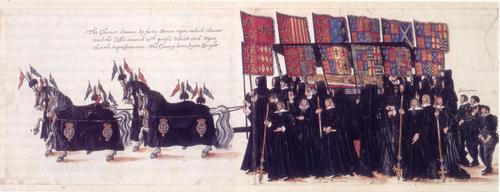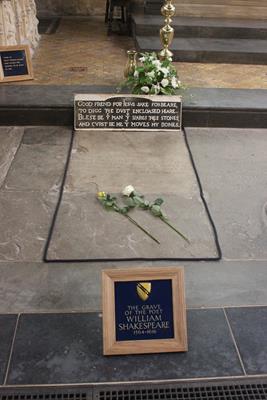Around 23 April 1564, a great mind was born in a small English market town. Such an immortal mind was baptised on 26 April 1564 in Stratford-upon-Avon in Warwickshire. With inauspicious beginnings as the third of six children born, first to survive infancy, to a leather merchant and landed heiress, William Shakespeare would go on to lead the life of an intellectual lion, whose roar can still be heard throughout the world today.
Shakespeare’s first poems, “The Rape of Lucrece” and “Venus and Adonis” were dedicated to his patron, Henry Wriothesley, Earl of Southampton, in the early 1590s. Beginning around 1594, Shakespeare joined a theatrical company known as the Lord Chamberlain’s Men, with the name changing to the King’s Men upon the accession of James I in 1603. Shakespeare is credited with writing more than 154 sonnets and 37 plays.
What made him such an enduring figure? As one peruses any of Shakespeare’s plays, it becomes apparent that not only was he a wordsmith with the ability to colour a scene with an actor’s speech, but also that he was a bit of a philosopher and psychologist. Britain’s Man of the Millennium had a profound effect on the English language, too.
Growing up, Shakespeare was exposed to the distinct dialects of the different classes as his father rose from the position of a leather merchant to high bailiff, and then Shakespeare’s own scaling of the social ladder. As a playwright, he used words from his personal lexicon that Shakespeare picked up throughout life. It is thought that Shakespeare may have contributed upwards of 12,000 words to the English language!
Shakespeare’s word choices allowed him to convey ideas more easily to the lower-classes that came to see his shows, which helped spread his popularity and influence. In Shakespeare’s day, English was not the language taught in schools; Latin was still the scholarly language. English, the language of common people, was ready to develop. Purposefully or not, that is just what Shakespeare did, and he has become immortal in his way because of it.
Shakespeare created word couplings commonly used today, such as “house and home” or “law and order.” Such couplings, along with words created by Shakespeare, helped fill in linguistic gaps between scholarly Latin rhetoric and common English. His influence is frequently seen today through cliché turns of phrase, too. Though often misquoted, as in the title of this brief article, but his great wit and imagination contributed inspiration and sayings to English, which are still motivational and comical today.
The fault, dear Brutus, is not in our stars,
But in ourselves, that we are underlings.
- Julius Caesar, Act I, Scene III, L. 140-141
On this 400th anniversary of Shakespeare’s death, let us all take a moment to think carefully about the faults in ourselves, then thoughtfully choose our words such that we may shape our destinies as Shakespeare may have done.
Heather R. Darsie lives in the United States with her family and three parrots. She works in the legal field, with a focus on children. She obtained a Bachelor of Arts degree in German Languages and Literature, then a Juris Doctorate in American jurisprudence, and studied abroad in Costa Rica and France. Heather has always loved history. She first became acquainted with Elizabeth I when she was in middle school and chose to write a book report about her. Since then, she has always held an interest in the Renaissance and its numerous enigmatic citizens, with particular focus on the history of England and Italy. She is currently working on a book on the heraldry of Tudor women and is also researching Anne of Cleves.
Sources & Suggested Reading
- Wong, Cathy. A Man of Many Words.
- William Shakespeare, 1564-1616.
- Shakespeare, William. Julius Caesar, Act I, Scene III, L. 140-141.
- Shakespeare’s Life. Folger Shakespeare Library.




Very interesting, things we were never taught about Shakespeare. Heather, keep up the good writings, I as one really appreciate your studies.
I know of Shakespeare, I have even visited his home in Stratford Von Avon. Just visiting a famous person in England was very special. But, I have never read any of his poetry, plays, etc. Is there a book about Shakespeare’s life would also have examples of his work. Growing up in California, we did not read about Shakespeare. Any advice would be greatly appreciated. Thank you.
Certainly, Ms. Monroe! The book, “William Shakespeare: the Complete Plays in One Sitting,” gives the plot of each play. I think it costs around $6 on Amazon, and I have seen it in Barnes & Noble stores in the US. I like that book because it gives a good overview of the plays, so I know what the plot is before I start reading it. Shakespearean English can be a challenge to read, at first, so knowing what type of play you’re reading always helps! Here is a link to Amazon:
http://www.amazon.com/William-Shakespeare-Complete-Plays-Sitting/dp/0762447567?ie=UTF8&keywords=shakespeare%2C%20running%20press&qid=1461799030&ref_=sr_1_5&sr=8-5
Community colleges and universities seem to enjoy putting on the Bard’s shows every now and again; that can be a good way to introduce oneself to his plays. Seeing the plays adds a lot of visual cues that I know I missed when reading.
The two plays I have found most easy for me to read are Macbeth and Romeo and Juliet. I hope this helps!
Just noticed a typo! The last word of the quote from Julius Caesar is :underlings,” not “underlngs.” Sorry for skipping the vowel!
Hi. Reading Shakespeare can be tricky and for having played him on stage and researched what his words meant in my speaches, I know that the man hid a lot of hidden meanings in the text. So when I read this quote, what I understand is something like: « the mistake is to think that we cannot act against/ are subordinate to fate/God » and/or ultimately that « we are not subordinates to God ». Am I reading this wrong?